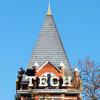news
Tech Researchers Share in DOE Funding Award
Primary tabs
Georgia Tech researchers will share in nearly $44 million awarded to more than 30 universities by the U.S. Department of Energy (DOE) for research into nuclear energy.
On May 7, Energy Secretary Steven Chu announced that 71 university-led projects would share in the award under the Nuclear Energy University Program (NEUP). Funding will continue for three years as part of DOE's investment in cutting-edge research for carbon emission—free nuclear energy.
"The next generation of nuclear power plants-with the highest standards of safety, efficiency and environmental protection-will require the latest advancements in nuclear science and technology," Chu said in a release. "These awards will ensure that the United States continues to lead the world in the nuclear field for years to come."
Proposals were submitted in four research fields: the Advanced Fuel Cycle Initiative (AFCI), the Next Generation Nuclear Plant (NGNP, also known as Generation IV Nuclear Energy Systems), Investigator-Initiated Research (IIR) and Light Water Reactor Sustainability (LWRS). Tech researchers secured project funding in the first three fields.
"The Nuclear and Radiological Engineering Program is a major research thrust [of the Woodruff School of Mechanical Engineering], and these awards reflect the quality of our people," said William Wepfer, the Eugene C. Gwaltney Jr. School Chair of Mechanical Engineering. "With Southern Co. and Georgia Power being among the first utilities to commit to building new nuclear power capacity, we are in a great position to provide critical research and technology to ensure safe, reliable and sustainable clean power."
Chu also announced that DOE is accepting applications for individual NEUP nuclear science and engineering scholarships and fellowships. In keeping with the Obama Administration's policy of training the next generation of American scientists, nearly $2.9 million will fund these fellowships and scholarships in an effort to support students entering the nuclear science and engineering fields.
"Georgia Tech has tremendous depth and breadth in materials, and this shows that we can compete at the highest levels," Wepfer said.
Selected projects include 31 U.S. universities in more than 20 states. Other universities, industries and national laboratories will serve as research partners and collaborators. Contracts for the projects are expected to be awarded by Sept. 30.
Groups
Status
- Workflow Status:Published
- Created By:Robert Nesmith
- Created:05/11/2009
- Modified By:Fletcher Moore
- Modified:10/07/2016

